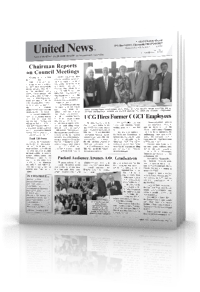Your Opinion Matters

Any time a person gives an opinion to another, that opinion helps make a difference. When United began, the Church leadership realized that there is strength in a multitude of counselors (Proverbs 15:22). United took its model from the New Testament Church, which gathered input from many sources before making major decisions.
We may look to the book of Acts chapter 15 for those examples. The gentile brethren were being told by some of Jewish heritage that they had to conform to the customs for entrance into Israel before they could gain a part in the Church and ultimately be saved. This opinion of those believing Jews brought consternation to the gentiles and to the apostle Paul who was their mentor. The elders were consulted at Jerusalem and through much input, the proper answer was derived and sent forth.
Often, when one offers input, that input tends to come with an expectation that the opinion will be endorsed and followed. Unfortunately, that cannot always be the case. While all input matters to the final decision on an issue, in some instances, one's input may not be evident in that final decision. Some will then reply, "Then why did you ask me for my input if you aren't going to follow it?" Since many different points of view and a variety of factors often must be considered, not all can be chosen. Each does, however, offer a perspective that might or might not be what is finally used. However, an opinion does help sometimes to know what to rule out and what might work. So, input is of value even if that opinion is not directly followed.
Paul's Example
Take the example of the apostle Paul in Acts 21. Paul desired to go to Jerusalem to bring Christ's gospel to that city. After all, had he not been one of the former chief Jewish prosecutors? Now he was preaching for the same group that he had tried to destroy. To Paul, that was an opportunity he could not pass up. He was given input, opinion and strong admonition not to go to Jerusalem as his very life would be in jeopardy.
Notice Acts 21:10-11. A prophet named Agabus came to Paul at Caesarea and illustrated that Paul would be bound by the Jews and ultimately turned over to the gentiles. Upon hearing the prophet's input, Paul's companions also gave their opinions to Paul that he should not go to Jerusalem (verse 12). This was sound input since the Holy Spirit led his companions to care about Paul's personal safety. They cared about him with brotherly love. They gave their input that he should not go to Jerusalem since they feared for his safety. Good input!
Paul, however, was the one who had to make the decision. While the input he received was caring and concerned, Paul had a greater mission in mind than to worry about his own personal safety. His reply to them is inspiring and helps us put opinions or input in proper perspective. "Then Paul answered, 'What do you mean by weeping and breaking my heart? For I am ready not only to be bound, but also to die at Jerusalem for the name of the Lord Jesus" (verse 13). Then in verse 14 we read, "So when he would not be persuaded, we ceased saying, 'The will of the Lord be done.'"
I have often seen in our Council of Elders meetings a very good idea put forth that looked like it would be suitable, only to receive other input that modifies or replaces the first good idea. This is the way we may make better, informed decisions, by giving and receiving input.
The input Paul received was good advice as far as his personal safety was concerned. However, Paul had a mission that to him was greater than his personal safety. He felt the need to bring the gospel to the Jews in Jerusalem. He made his decision after receiving their input and his decision was different from what he heard.
Our Input
Sometimes we have opportunity to give input on amendments to the Constitution, Bylaws and certain policy papers. United's governing documents call for amendments to be distributed in each congregation for input. The Council and congregations are authorized to use members as advisers. Do we take advantage of these opportunities? Or do we feel that our input will not be received? Or, we may offer our input in such a way that we demand that it be followed.
While it is admirable to be enthusiastic about our opinions, we must put them in proper perspective. We need to realize that our opinions count, but sometimes they form only a portion of the picture. Others may have offered opposing opinions as forcefully and thoughtfully as our opinions. Those in the decision-making position will hopefully consider all of the input and come to a proper decision. All of the input is important to that process.
In Proverbs 18:17 we read this wisdom, "The first one to plead his cause seems right, until his neighbor comes and examines him." There is wise advice in this inspired scripture of the wisdom literature of the Bible. I have often seen in our Council of Elders meetings a very good idea put forth that looked like it would be suitable, only to receive other input that modifies or replaces the first good idea. This is the way we may make better, informed decisions, by giving and receiving input.
This principle also works in families, in speech clubs and among friends.
So, let's be willing to offer our opinions on issues where they are invited or expected and realize that our opinions do matter.


